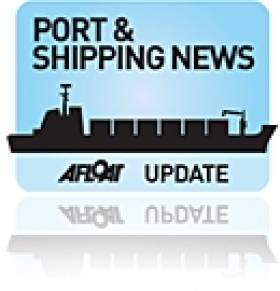Displaying items by tag: Arklow Shipping bulkers
Largest Irish Owned Flagged Ships Trading On Both Sides of the Atlantic
#BulkerSisters - Arklow Spirit last night returned to anchor in Dublin Bay to await orders while another bulk-carrier occupies the same berth to where the Irish flagged ship is one of a pair of the largest registered in the State, writes Jehan Ashmore.
As Afloat.ie previously reported Arklow Spirit on Monday made a maiden call to Dublin Port. The 182m long bulker registered in the Co. Wicklow port had discharged animal feed from Brazil via Cork (Ringaskiddy). A sister Arklow Spray, also of 33,905dwt are the largest ships listed on the Irish Shipping Register that are owned by an indigenous company, Arklow Shipping Ltd.
Arkow Spray the newer of the sisters dating to 2014 and built from the same South Korean yard, is currently docked in the USA at the Port of New York. The bulk-carrier docked at a berth off the East River that is reached by the Hudson River, had arrived in recent days from Providence, Rhode Island.
Normally both ASL bulk-carriers are to be found operating on global deep-sea shipping lanes compared to serving in domestic waters as in the case of Arklow Spirit. It is otherwise commonplace to have short-sea traders call to Dublin having operated within north-western Europe. It should however be noted that ASL's smaller 14,990dwt bulkers of the 'M' class trade within Irish waters too given Arklow Marsh made a recent call also to the capital.
As for the Dublin docked bulk-carrier referred in the introduction, this is the Cape Moreton a Hong Kong flagged ship that is berthed in Alexandra Basin. The bulker is marginally smaller in terms of both dwt (32,875) and in length overall at 179m. What is common though is that the trio of bulkers have the same number of cargo holds, five and served by four deck-mounted cranes.
Cape Moreton completed in 2010 is operated by Pacific Basin, one of the world's leading owners of modern Handysize and Supramax dry bulk ships.
The company is headquartered and listed in Hong Kong, an autonomous territory of China. The shipping company was established a decade before the handover of the former British colony to China took place in 1997, has currently a fleet of more than 250 vessels trading on a global basis.
This year Pacific Basin opened a commercial office in Rio de Janeiro, Brazil.
Arklow Shipping Expands Fleet into Handysize Bulker Market
#PORTS & SHIPPING – Arklow Shipping is further expanding its bulker fleet and moving into the market for larger vessels with an order for three ships in South Korea, according to Tradewinds.
The company which is headquartered in the Co. Wicklow port has booked two 35,000-dwt handysize-bulkers and a general cargoship at Daesun Shipbuilding. TradeWinds sources say Arklow is paying a premium for the ships against more competitive pricing from China.
Brokers price the Daesun bulkers at around $25.5m, which compares to similar deals in China at around $22m. As for the general cargoship, she will be delivered in the first half of 2013 and the bulkers in the second half of the year. Arklow previously signed up for a series of 14,000-dwt multipurpose (MPP) vessels at Mokpo, which later went into administration.
The orders were then passed on to Sekwang Shipbuilding only for it also to fall into financial difficulties. Daesun has had its problems too and was delisted from the Seoul Stock Exchange in April as it did not meet the bourse's financial requirements.
The latest order appears to have taken Arklow's owned fleet into the larger-handysize segment. So far it has focussed mainly on bulkers, general-cargo and MPP ships up to 14,000 dwt. It has a fleet of 55 ships including 12 newbuildings, most of which are registered in the Republic of Ireland. Arklow declines to comment on the Daesun order.





























































